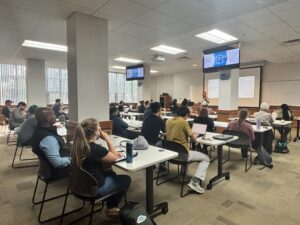A recent survey shows that 55% of Americans plan to search for a new job within the next year.
This spring, a new phenomenon dubbed ‘The Great Resignation’ arose where employees quit their jobs in tidal wives to pursue new chapters in their careers.
What the Numbers Say
In August U.S. Bureau of Labor Statistics highlighted the employee quit rate hit an all-time high of 2.9%.
A Microsoft report researched how many workers were considering leaving their jobs before the end of 2021. Of 30,000 survey participants across 31 countries, 41% were thinking about resigning.
A recent McKinsey & Co. survey revealed that out of 65,000 North American employees, 42% of women and 35% of men reported “feeling burned out often or almost always” in 2021.
The Why Behind the Bye
The pandemic allowed workers to rethink their work conditions and long-term goals. Factors such as concern for personal safety or disinterest in current work were reported as reasons to move on.
Workers are choosier than ever, feeling a newfound empowerment to search for organizations that will support their goals, provide work-life balance and recognize their contributions. Employees have more options than ever and are easily tempted to move on — costing employers their talent base.
People crave recognition, professional development opportunities and flexibility.
“Organizations should treat their human resources like humans. Employees should be made to feel appreciated, valued and respected,” said Todd Dockery, lecturer of management, University of Tennessee at Chattanooga’s Gary W. Rollins College of Business. “This a great way to ensure a competitive advantage and it’s the right thing to do. Some organizations are now learning the hard way as ‘The Great Resignation’ continues.”
Big Problems, but Greater Solutions
Now is the time for company leaders to learn and employ effective talent retention solutions.
- Reward employees through recognition
Discover ways to reward employees so that you are reinforcing organizational goals. When employees feel undervalued for their contributions, this implicitly weakens loyalty.
How to solve this? Create a systematic employee recognition program. SHRM lists essential program criteria, including sufficient funding, alignment with company goals and values, appropriateness and sincerity, timeliness, artful execution, simplicity and regular evaluation.
In addition to employee recognition, peer recognition instills a sense of team spirit and transparency among coworkers. For example, UT-Chattanooga recognizes employees monthly with the Chancellor’s Blue Ribbon Award. The award honors employees who have gone above and beyond to display excellent job performance, dependability, innovation and promote a pleasant working environment. UTC faculty, staff, students and community members can nominate employees.
Personal milestones count. Consider celebrating work anniversaries and birthdays in a way that fits with your organization’s culture.
- Provide professional development opportunities through training
Top performers leave organizations when they feel they are not developing as professionals.
Some 70% of U.S. workers say they’re at least somewhat likely to accept an offer with a new company known for investing in employee learning and development.
“In January 2020, before the onset of the pandemic, the Harvard Business Review cited training and development as one of the most effective retention strategies that organizations could deploy,” said John Freeze, director, UTC’s Center for Professional Education. “Now, some 20 months later amidst ‘The Great Resignation,’ employees are abandoning organizations that have not been effective in contributing to their professional development to find ample opportunity elsewhere.”
Find opportunities for employees to expand their knowledge. Offer reimbursement programs so employees can pursue professional certifications or expand skills. UTC offers individualized programs. The university also offers customizable corporate training programs that teams can participate in together. Team training builds cohesiveness, boosts morale and highlights an organization’s strengths and weaknesses to build more advantageous workplaces.
- Become more flexible, adaptable and responsive
“Historically, there’s been a perception that if employees were not seen, they weren’t working — or at least not as effectively as they would in the office. COVID shattered those perceptions,” said Lauren Mason, principal and senior consultant, Mercer. Companies such as Apple, Capital One and Ford shifted to remote work. And many employees proved the work they do is more important than where they produce the work. A Mercer survey revealed 752 out of 800 employers saw productivity was the same or higher than before the pandemic.
Research shows hybrid working arrangements are often ideal for both employers and employees to create the best overall outcomes. Employees can have face-to-face communication and collaboration a few days a week while also enjoying reduced commutes, fewer distractions, and a greater work-life balance. Organizations should consider implementing a hybrid option into their compensation package. Organizations that need employees in the office every day should consider offering flexible work schedules on an individual basis.
People-centric perks go a long way in building loyalty and trust with employees. By knowing employee needs and celebrating their accomplishments, organizations can expect to see their talent retention rate rise.
Author Bio:
Marah Whitaker serves as the marketing assistant for the UTC Center for Professional Education (CPE), which manages all of UTC’s non-credit certifications, credentialing and workforce training. We offer a medical career academy, professional development courses and custom corporate training. At UTC, we believe in continuing education and delivering excellent educational programs.











